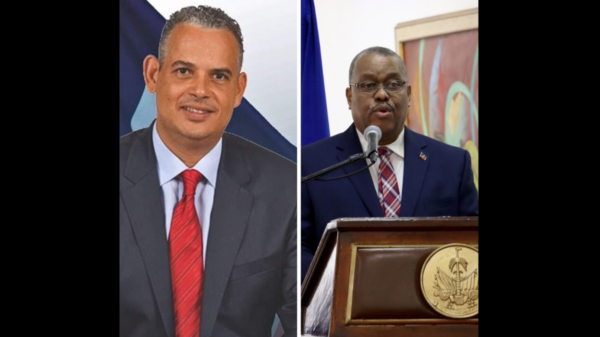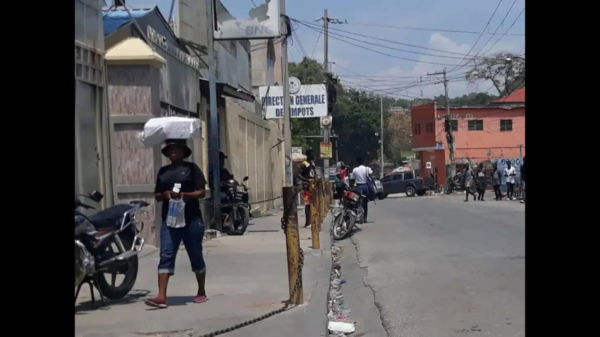By Juhakenson Blaise
From – https://haitiantimes.com/
Reprinted – by Texas Metro News

PORT-AU-PRINCE— In a significant reversal, the Pitit Desalin political party, led by former Senator Jean-Charles Moïse, announced on Wednesday the appointment of its representative to the Caricom consensus-led Transitional Presidential Council (TPC). This council is set to replace the government of the resigning Prime Minister, Ariel Henry.
The leaders of Pitit Desalin, who had previously refused to accept the Caricom consensus which led to the formation of the Presidential Council—a body designed to restore democratic institutions in Haiti—have now appointed Emmanuel Vertilaire, a former investigative judge from the Court of First Instance in Cap-Haitien, to represent their party. Until recently, former Senator Moïse had supported a proposed three-member presidential council that included his ally, Guy Philippe. The latter, a former rebel and coup leader, has been convicted of drug trafficking and money laundering.
Reports in the Haitian media suggest that Moïse’s reversal of position came under intense pressure from international actors to comply with the Caricom agreement.
This is a claim that the former senator did not deny. During an interview with Le Nouvelliste newspaper, Jean Charles acknowledged that he made the decision to participate in the Presidential Council at the request of a “major country” that urged his party to break the deadlock, allowing the council to be announced and officially installed. However, he declined to disclose the name of the country.
Still, Moïse was clear during a press conference earlier this week. “I will resist the seizure of power [TPC] proposed by Haitian actors and endorsed by Caricom,” he stated.
Several individuals have criticized the leader of Pitit Desalin for his inconsistencies. Both social media platforms and mainstream media have recorded numerous reactions labeling Moïse as a politician without a clear stance. Jertry Dumont, founder of AyiboPost, satirically commented on X—Formerly Twitter— about Moïse’s inconsistency.
Haitian Filmmaker and producer Richard Senecal stated that despite the harm of the crisis, it has helped expose those with no fixed position, colloquially known as “Abolotcho” – another term for political chameleons in Haiti. Senecal urged Haitians to remember these individuals and reject their proposals in the future.
With Emmanuel Vertilaire representing Pitit Desalin, the Presidential Council’s composition appears finalized. In another shift, Dominique Dupuy is slated to replace Ghislaine Mompremier, former Minister for Women’s Affairs in Michel Martelly’s government, as the representative of the Historical Compromise/RED/EDE in the council. A source close to EDE/RED confirmed Dupuy’s nomination in an interview with The Haitian Times.
Below is the complete composition of the council:
- Fritz Alphonse Jean – Montana Accord political group.
- Lesly Voltaire – Fanmi Lavalas political organization.
- Louis Gérald Gilles – December 21 Agreement political group, allied with resigning Prime Minister Ariel Henry.
- Laurent Saint-Cyr – Private sector, a member of the High Council of the Transition (HCT).
- Edgard Leblanc Fils – January 30 political group.
- Dominique Dupuy – Historical Compromise EDE/RED.
- Emmanuel Vertilaire – Pitit Desalin political party.
In addition to the seven voting members, the names of two observers, Frinel Joseph and René Jean-Jumeaux, representing civil society organizations, have been disclosed.
Dominique Dupuy’s nomination by the Historical Compromise group followed her impactful speech at the 219th session of the UNESCO Executive Council. Dupuy pledged not to remain silent as her country descends into instability and violence, emphasizing that Haiti’s educational, scientific, and cultural sectors are plunging into despair, jeopardizing the future of millions of Haitians.
Haiti’s permanent delegate stated that remaining silent about Haiti’s situation at this UNESCO event would be tantamount to renouncing the pioneering struggles led by the founders of the Haitian nation and dismissing the courage of those who continue to resist. “So I am committed not to remain silent, neither today nor tomorrow,” Dupuy said. “We must remember that there is still a country inhabited by human beings thirsty for peace and a future,” she added.
This week saw changes in representations and reversals of positions among political actors in a series of exchanges as Haiti awaited the official publication of the list of representatives from various parties and sectors that compose the TPC, pursuant to the agreement reached between Caricom and Haitian political actors on March 11.









You must be logged in to post a comment Login